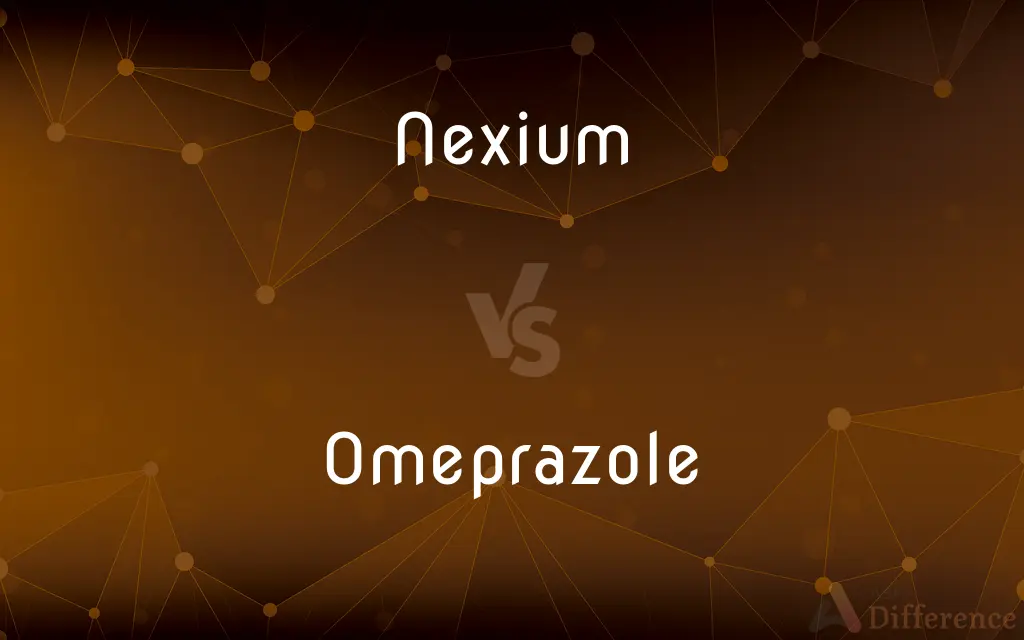Nexium vs. Omeprazole — What's the Difference?
By Tayyaba Rehman & Urooj Arif — Published on February 4, 2024
Nexium (Esomeprazole) and Omeprazole are proton pump inhibitors used to treat acid-related stomach issues, but Nexium is a newer, more targeted form.

Difference Between Nexium and Omeprazole
Table of Contents
ADVERTISEMENT
Key Differences
Nexium, also known as Esomeprazole, and Omeprazole are both medications used to treat gastroesophageal reflux disease (GERD) and other acid-related conditions. While they share similar functions, Nexium is a more recent development in this class of drugs.
Omeprazole, the active ingredient in medications like Prilosec, was one of the first proton pump inhibitors (PPIs) on the market. Nexium, on the other hand, is a newer version of PPIs, often considered an advancement over Omeprazole in terms of efficiency.
Nexium is specifically designed to treat certain conditions with a more targeted approach, which might offer improved symptom control for some patients compared to Omeprazole. However, Omeprazole has a longer history of use and is well-established in terms of efficacy and safety.
The cost and availability of Nexium and Omeprazole can vary. Omeprazole is generally less expensive and available as a generic, making it more accessible. Nexium, being newer, might be more expensive and less likely to be available in generic form.
Both Nexium and Omeprazole can cause similar side effects like headache, nausea, and stomach pain. However, the incidence of these side effects might vary between the two drugs, with some patients tolerating one better than the other.
ADVERTISEMENT
Comparison Chart
Introduction Year
Newer, introduced later
Older, one of the first PPIs
Targeting Efficacy
More targeted for specific conditions
Broad-spectrum acid reduction
Availability
May be more expensive; less commonly generic
Often less expensive; widely available as generic
Side Effects Profile
Potential for different side effect incidence
Established side effect profile
Formulations Available
Comes in multiple forms, including delayed-release
Available in various formulations, including over-the-counter
Compare with Definitions
Nexium
Often used for long-term management of GERD.
He's been taking Nexium for his GERD for over a year now.
Omeprazole
Often prescribed for treating erosive esophagitis.
After diagnosing erosive esophagitis, the doctor recommended Omeprazole.
Nexium
Can help heal damage to the esophagus.
Nexium not only relieved her symptoms but also healed her esophageal damage.
Omeprazole
A medication used to reduce stomach acid.
Omeprazole has effectively managed her acid reflux symptoms.
Nexium
May be prescribed for Zollinger-Ellison syndrome.
Due to his Zollinger-Ellison syndrome, he takes Nexium daily.
Omeprazole
Commonly used to prevent stomach ulcers.
To prevent ulcers, he takes Omeprazole daily.
Nexium
Sometimes used in combination with antibiotics to treat gastric ulcers.
Her treatment plan includes Nexium along with antibiotics for her ulcer.
Omeprazole
Can be used over-the-counter for heartburn relief.
She bought Omeprazole over the counter to relieve her occasional heartburn.
Nexium
A proton pump inhibitor used for treating acid reflux.
The doctor prescribed Nexium to help with her heartburn.
Omeprazole
Sometimes used in treating H. pylori infections.
Her H. pylori infection is being treated with antibiotics and Omeprazole.
Omeprazole
A proton pump inhibitor drug, C17H19N3O3S, that suppresses gastric acid secretion and is used for the treatment of duodenal and gastric ulcers and gastroesophageal reflux disease.
Omeprazole
(pharmaceutical drug) A substituted benzimidazole (trademark Losec, Prilosec) which is a proton pump inhibitor and inhibits secretion of gastric acid, being given orally in the treatment of ulcers and gastroesophageal reflux; 5-methoxy-2-(4-methoxy-3,5-dimethyl-2-pyridylmethylsulfinyl)benzimidazole, C17H19N3O3S.
Omeprazole
Antacid (trade name Prilosec) that suppresses acid secretion in the stomach
Common Curiosities
Are there any common side effects of Omeprazole?
Common side effects include headache, nausea, and stomach pain.
What is Nexium used for?
Nexium is used to treat acid reflux, GERD, and esophagus damage.
Can Omeprazole be bought over the counter?
Yes, Omeprazole is available over the counter for treating heartburn.
Can Nexium heal esophageal damage?
Yes, Nexium can help heal damage to the esophagus from acid reflux.
Can Omeprazole be used for children?
Omeprazole is sometimes prescribed for children with specific conditions.
How quickly does Nexium work?
Nexium typically starts working within a few days, but full effects can take longer.
Is Nexium more effective than Omeprazole?
Nexium may be more effective for certain conditions due to its targeted action.
How long can you take Omeprazole?
Duration of treatment varies; some conditions require long-term use.
Does Nexium interact with other medications?
Nexium can interact with some medications; it's important to consult a doctor.
Is Omeprazole safe for long-term use?
Long-term use is generally safe but should be monitored by a healthcare provider.
Is Nexium better than generic esomeprazole?
Generic esomeprazole is equally effective but may be more cost-effective.
Can Omeprazole cause kidney problems?
Long-term use of Omeprazole has been linked to kidney issues in some cases.
Are there alternatives to Nexium for acid reflux?
Other PPIs and lifestyle changes can also be effective for acid reflux management.
Can Nexium cause weight gain?
Weight gain is not a common side effect of Nexium.
Is it safe to take Omeprazole during pregnancy?
Omeprazole should only be used during pregnancy if clearly needed.
Share Your Discovery

Previous Comparison
Rooted Android Phones vs. Unrooted Android Phones
Next Comparison
HTML5 vs. XHTML5Author Spotlight
Written by
Tayyaba RehmanTayyaba Rehman is a distinguished writer, currently serving as a primary contributor to askdifference.com. As a researcher in semantics and etymology, Tayyaba's passion for the complexity of languages and their distinctions has found a perfect home on the platform. Tayyaba delves into the intricacies of language, distinguishing between commonly confused words and phrases, thereby providing clarity for readers worldwide.
Co-written by
Urooj ArifUrooj is a skilled content writer at Ask Difference, known for her exceptional ability to simplify complex topics into engaging and informative content. With a passion for research and a flair for clear, concise writing, she consistently delivers articles that resonate with our diverse audience.













































